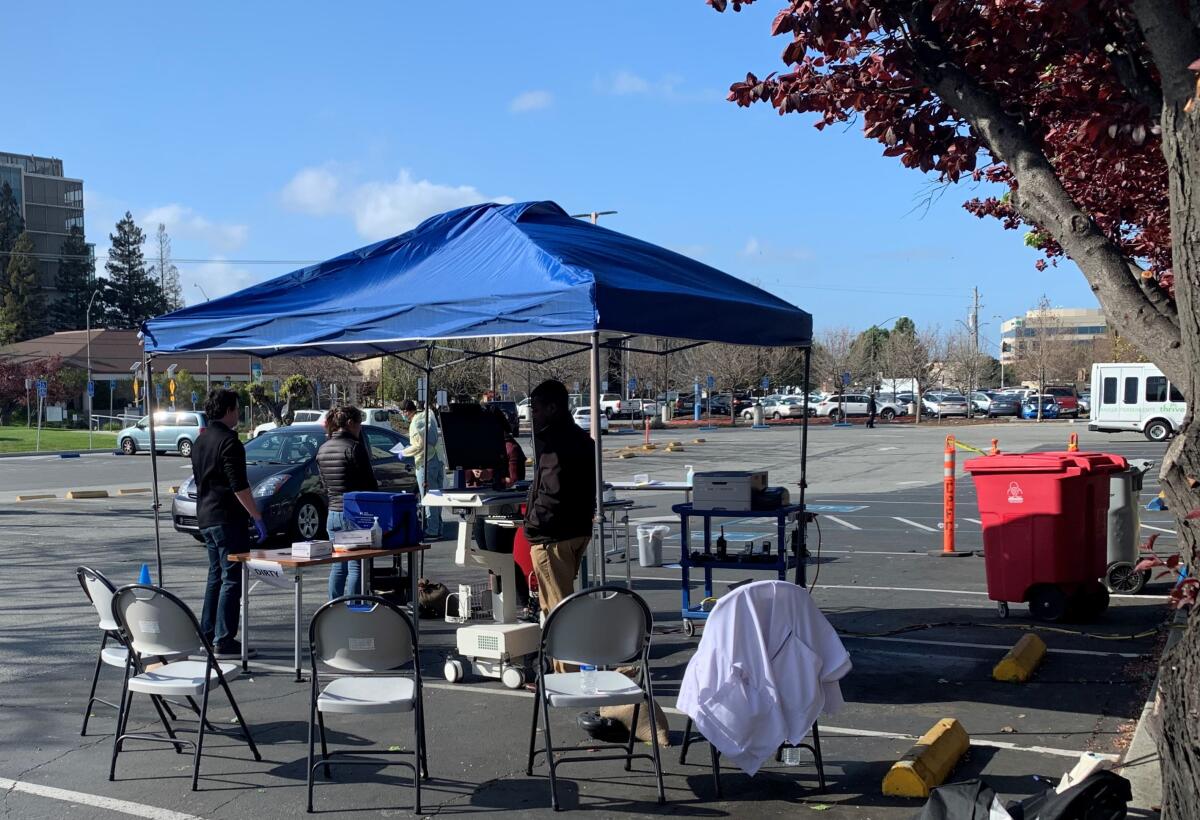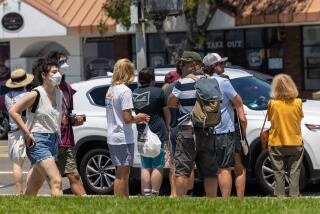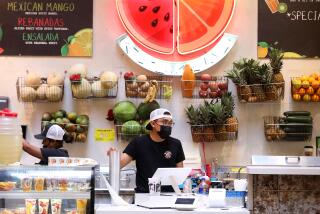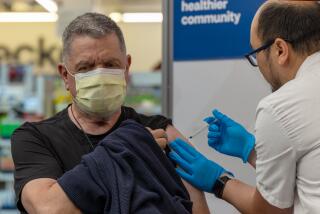Kaiser is doing semi-secret, drive-by Bay Area virus tests
- Share via
REDWOOD CITY, Calif. — Amid the new coronavirus, the freeways of the Bay Area are less clogged than usual, and shelves of grocery stores look apocalyptically ransacked — byproducts of California being part of an international pandemic.
It also comes with some advantages: If Bay Area residents belong to a certain healthcare plan, they can easily drive through the region’s unusually free-flowing roads to visit a drive-through test site for COVID-19.
They just open their mouth. Get tested. Then put the car in gear.
Two days later, they get their results.
On Friday, a drive-through coronavirus testing facility was set up in one of several outdoor parking lots owned by Kaiser Permanente in Redwood City. It represented a fragment of the aggressive drive-through testing that South Korea conducted to help stem COVID-19; but for California, it was a start.
Under a blue pop-up tent, a team that rotated between six and seven staff members waited for incoming automobile-steering patients.
At 4:20 on a blustery but sunny afternoon, a dark gray Toyota Prius, driven by a woman in sunglasses, rolled up to the cordoned-off parking lot, and was waved in by a uniformed security guard. She pulled gingerly up to the pop tent, rolled down her window and took off her shades.
Bustling into action, a nurse helped Rod Mokhtari, Kaiser’s Redwood City assistant chief of medicine, don himself with a yellow paper gown. The nurse then helped him swaddle his hands with a pair of purple latex gloves.
Properly adorned, with smock, gloves, a mask and protective glasses, Mokhtari stepped out from the tent, and approached the driver’s side window — sampling kit in hand.
Patient and doctor exchanged a few words, before she tilted her head back slightly and opened her mouth wide. Mokhtari, cotton swab in hand, reached in and with small, circular motions, swabbed the inside of her mouth. Satisfied, he pulled the utensil out, and dropped it into a container.
He then grabbed a new one, and with her head still tilted back, he inserted it into her left nostril — which caused her to blink a few times — extruded it, and also dropped it into a container.
She then drove off. Start to finish: no more than 5 minutes.
Ten minutes later another patient arrived, and the process was repeated.

Mokhtari was not available for an interview. The name of the nurse was not provided. But the procedure provided a small glimpse of how South Korea, with its government-run healthcare system, could test so many people so fast.
As of this week, South Korea, a nation of 51 million, had tested about 250,000 people since Jan. 20, when the outbreak occurred there. In the United States, with a far higher population, less than 15,000 had been tested by Friday, according to published reports.
California’s lack of statewide testing, compounded by the federal government’s inability to procure key chemicals needed for the tests, is one reason Silicon Valley has become ground zero for the virus statewide. As of Friday, Santa Clara County had reported 79 confirmed cases, and surrounding counties had reported many more.
According to Marc Brown, director of national communications for Kaiser, the medical group has set up only three of these drive-up testing sites. One in San Francisco, another in San Leandro, and this one, here in Redwood City.
The facilities are not permanent and change from day-to-day.
He said no sites have yet been set up in Southern California, and had no information about plans to do so. However, he said other regional centers, such as those in Colorado and the Washington, D.C., will be trying them out as early as this weekend.
“These aren’t for the general public,” he said, noting that only patients who are Kaiser members and have been provided an appointment with the facility by their doctor are permitted access.
The sites are not publicly disclosed, he said, because the point of the procedure is to reduce the risk of exposure that occurs in hospital or clinic waiting rooms — where several people can come into contact with one another and the virus can be transmitted. “We don’t want crowds showing up.”
Drive-through testing is also being tried in New Rochelle, N.Y. — where a large cluster of COVID 19 cases are located — and Philadelphia. The number of people tested are low, but New York’s governor was optimistic Friday.
“We’re partnering with Northwell and BioReference to run the state’s first drive-through testing facility and ensure the highest-risk population gets the tests they need to help us contain and combat this pandemic,” Gov. Andrew Cuomo said.
More to Read
Sign up for Essential California
The most important California stories and recommendations in your inbox every morning.
You may occasionally receive promotional content from the Los Angeles Times.











